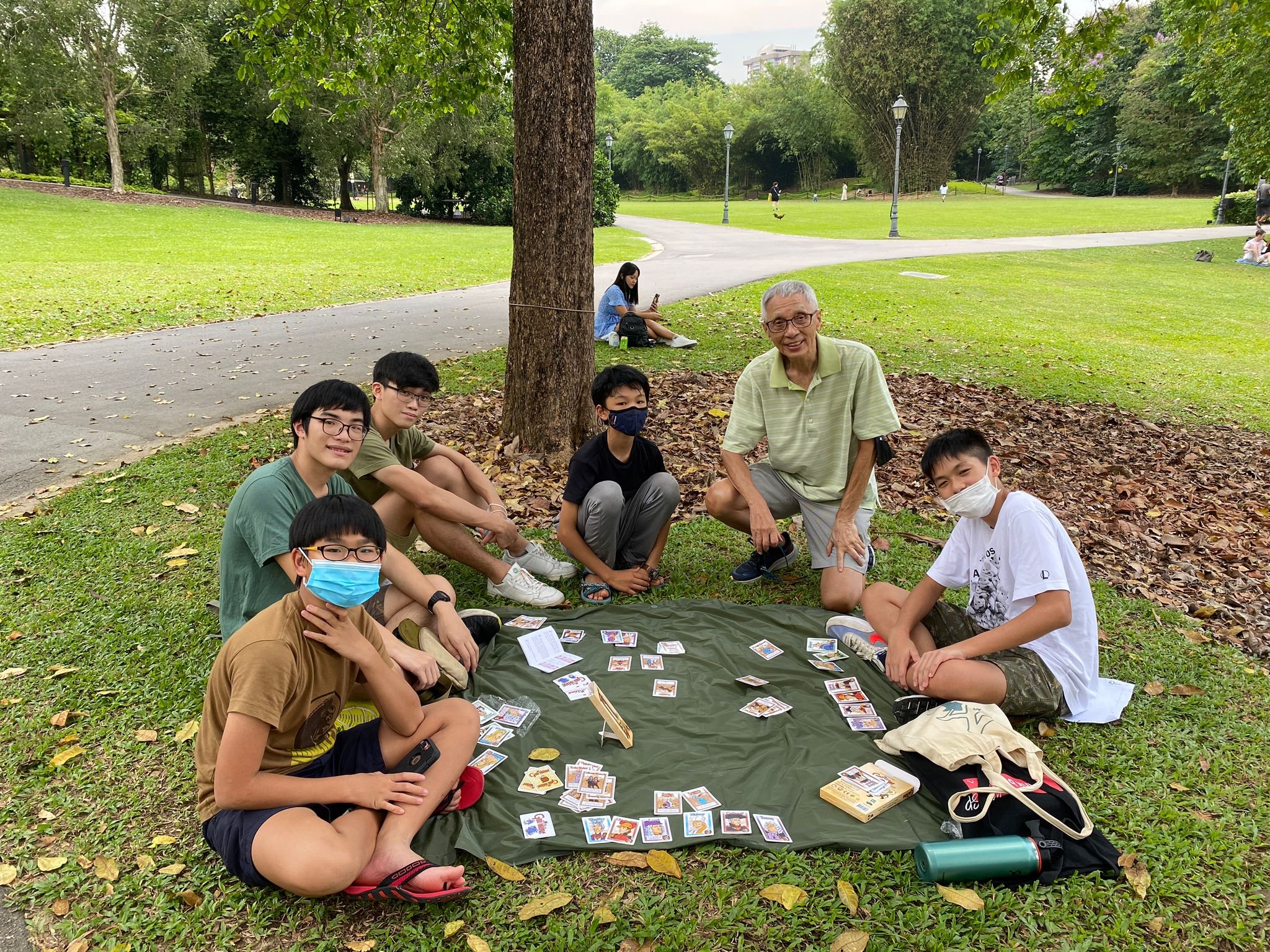Growing Up in the Church
Matthew Seah, one of our youth leaders, shares what serving in the youth ministry is like, and how the whole church is also involved in discipling and caring for our youths. Joshua Lee, a youth, shares how those older than him in the faith have modelled and helped him in his faith journey.
A personal experience of God as a youth
My (Matthew’s) experience as a teenager being pulled in all directions by worldly idols made me desire to work with teenagers in helping them to resist such pulls with the gospel.
During my secondary school and junior college (JC) years, I readily answered the call of the world to excel in the things of the world. These included scoring high marks at tests and examinations, doing well in co-curricular activities and having a clique of friends that I could call my “best friends forever” (BFFs) and would always have my back. Praise be to God that the more I hunted for these treasures, the more I thirsted for something better. Towards the end of JC, God convicted me that these blessings, though good gifts from Him, had been twisted by my sinful heart into idols. I made them play the role of God, demanding that they provide a form of “salvation” for me in terms of securing me and granting me everlasting joy. By God’s grace and mercy, He made me see that only Christ could provide these things through His work on the cross.
Just like my teenage self, our youths are being shown a multitude of false sources of joy, security and peace. Many of these sources are terribly enticing, and many of the youths in GBC wrestle with such idols. Having struggled with these idols as a teenager, I now have a much clearer sight of the gospel as God’s power to save (Rom 1:16), as well as our youths’ desperate need for this gospel while they journey through adolescence. I decided to work with and serve teenagers in GBC’s youth ministry in the hope that God would use me to display this gospel for them.
Working with youths
It has been a great joy to see God working in the hearts of our youths. At times, He causes them to ask difficult questions, such as “How can we trust the reliability of the Bible?” and “Why do sin and suffering exist?” Though these questions may catch us by surprise, the fact that youths (and at times, even younger children) ask such questions has long been anticipated by Scripture: Moses writes of the ancient Israelites’ children asking such questions as “What is the meaning of the testimonies and the statutes and the rules that the Lord our God has commanded you?” (Deut 6:20).
At other times, God has given me and my team the privilege to hear our youths share about God’s work of convicting their hearts and turning them to Christ. For instance, recently a youth shared that he believed that Christ had come to die for his sins because he understood this to be a major crux of the Christian life. He compared this to merely doing “Christian things” like clocking church attendance, which he explained as something he only did to follow his parents without much thought. While our youths do not display these signs of growth at every youth CG gathering, these are signs of God’s grace in getting our youths to think more about Him. We covet the church’s prayer that, as leaders, we may receive grace in knowing how to respond to their questions biblically and sensitively, and to encourage and teach them the word of God faithfully.
Another great joy that I have in serving in the youth ministry is to see the parents of our youths, and the larger community of GBC, take on the challenge of serving and discipling our youths! The discipleship of our youths was never meant to be done by the youth ministry alone. Rather, Scripture points to parents as the primary disciplers of their own children, while the rest of the church comes in as co-labourers (Deut 6:20-25, Eph 6:4).
This is also what we covenanted to do as members of GBC (Member’s Covenant Statement no. 5), and I have been privileged to have observed the many ways in which we have honoured this covenant in trying to bless our youths with the gospel. I have heard encouraging stories of families setting aside a short amount of time to read the Bible together. Some of our members have also voluntarily initiated one-to-one Bible reading with our youths from time to time. Whenever the youth ministry requests for practical aid for our events—such as homes to host our youths for a social gathering, or CGs to provide meals for us during youth camp—the church has been always ready to respond to our calls. God has blessed GBC to bless the youths among us, and may we grow in stewarding well what He has given to us in the hope that our youths would come to know and be transformed by the gospel.
Perhaps the biggest struggle in serving in the youth ministry is the amount of time and energy it takes up. We do our best to have weekly meetings and events that may last for as long as two hours. Time also goes into preparing for the fortnightly Bible studies or to plan for the social events. For many of our youth leaders, this commitment is often piled on top of other commitments such as full-time work or studies and CG gatherings. In terms of energy, much is often needed to interact meaningfully with youths. There is a certain generation gap between me and the youths, which then requires more thought on my part to engage youths in a way that shows them that I care for them. I have to put in an especial interest in what they are interested in, as well as to be accustomed to the lingo and mannerisms they use in their interaction. However, I should clarify that these details are not words of complaint but a description of the cross that our youth leaders have committed to carry. By the grace of God, we have carried it thus far, and we will continue to trust God to provide and lead us.
The church’s role in discipling youths
The discipleship of youths is not just for the youth ministry. God has commanded that the whole church should be involved. Deuteronomy 6:20-25 expected that the children in the midst of the ancient Israelites would ask questions pertaining to the salvation of God. Likewise, Deuteronomy 31:19-22 requires that the Israelites teach their children Moses’ song of salvation, so that “it will live unforgotten in the mouths of their offspring”. While the former reference is an explicit command to the parents of children (“you shall say to your son”), the whole of Deuteronomy itself was addressed to the people of God, which today refers to local churches such as GBC (Eph 2:19-22).
Youths meeting other church members and learning from them.
The command to be involved in serving the children and youths in our midst makes perfect sense in the context of many other commandments regarding the mission and life of the church. Jesus commanded us to go and make disciples of all nations and to teach them His word (Matt 28:19-20), and our youths who do not naturally know God (Rom 3:10-18) are in equally desperate need of the gospel as any other unbeliever.
Teaching the gospel to our youths involves direct, verbal instruction, as well as indirect instruction through modelling Christlike behaviour for them, and both of these things require the full involvement of the church. When called to bear one another’s burdens in our sin struggles (Gal 6:2), that surely includes hearing the burdens of our youths and helping to bear them too. We should also rejoice with our youths when they rejoice over performing well in school (by teaching them to give glory to God), and weep with them when they weep over loneliness or anxiety (by pointing them to the one who shall wipe their tears away once and for all—Rom 12:15).
Our youths are a part of our church. Regardless of whether they have been saved or not, our life as a church should impact them by pointing them continuously to the gospel rather than the idols of this world. May we answer this call together by the grace of God.
We now hear from Joshua Lee, one of our youths. Joshua is 18 this year, and has been attending the youth group since he was 13.
My transition into youth from Sunday school was rather smooth as I had quite a few friends in the same batch as me. Moreover, I have an older brother who was already in youth who helped me get used to the environment and how the youth group worked. But what made youth group stand apart from Sunday School was the outgoing and friendly youth leaders who really put in the extra effort to form deep and personal connections with the youths.
From childhood to the teenage years
Like most second-generation Christians, the reason for going to church was usually around the lines of “because my parents tell me so”. But certainly, faith is not something that is inheritable and should not be. Sunday School was a time when I learned about God’s character while during youth is when I started to form a personal relationship with God.
Personally, I am a very observant person, so for me, seeing older Christians, whether it be the youth leaders or anyone in church, devote their lives to the gospel, sacrificing their time and the energy towards the ministries that they serve in, really reflects their love for God. Seeing their love for God, and how they trust Him wholeheartedly with their lives, makes me reflect on what could possibly motivate them to do so, to which the answer is “because he first loved us” (1 Jn 4:19).
Seeing how they show sacrificial love towards others illustrates that faith is indeed real, thus helping me to anchor my own belief in this faith.
Learning from peers and older members
For my peers, we are more or less at the same stage in our faith, where we are still seeking what's God's plan for us. However, hearing each other's struggles in our walk with God, and how we persevere through seeing God's hand in our lives, is an encouragement to us. This is where the youth leaders come in; they are able to give us biblical advice on how God wants us to live our lives as Christians. Sometimes they simply tell us about an experience they had and how they trusted in God.
Joshua and the youths had a chance to meet Jimmy, an older church member, and got to know him better.
In addition, there is comfort knowing that these older Christians would be able to understand our struggles in the faith as they have been through such circumstances before, hence any advice that they give is fully out of love.
As one of the older youths, I very much hope that I can be an example for the younger ones to follow or even someone to talk to if the youth leaders are busy or have their own commitments. All in all, having someone who has been in the faith for a long time is very important for those who are still young in their faith as they can be a source of comfort, wisdom and guidance whenever they need it. Hence, it is my prayer that older Christians will be good role models and guides to others seeking the faith.






